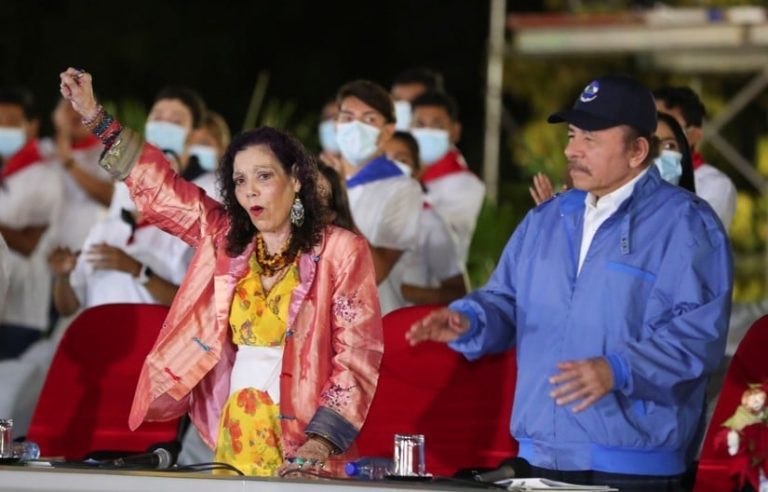12 de noviembre 2021

The Return of the Military

PUBLICIDAD 1M
PUBLICIDAD 4D
PUBLICIDAD 5D
Costa Rica, Chile, Peru, Panama, Dominican Republic, Uruguay, Colombia and Ecuador vow that they will continue to pressure within the OAS.

Daniel Ortega and Rosario Murillo. Photo: Government / Taken from El 19 Digital
Governments of different Latin American countries denounced that the voting in Nicaragua did not comply with “minimum guarantees” of transparency, so they warn that they will adopt “all the necessary measures” to restore democracy in the country. Actions that —inclusively—, could lead to the expulsion of this nation from the Organization of American States (OAS).
In its latest report, the Supreme Electoral Council (CSE), controlled by Ortega, assigned 75.92% of the votes to the ruling couple of Daniel Ortega and Rosario Murillo, in elections in which 65.34% of the registered voters allegedly voted. In contrast, the independent observatory Urnas Abiertas reports that only 18.5 of those eligible to vote went to the polls.
The Government of the Dominican Republic rejected “the mock election” held in Nicaragua and called on OAS members to adopt “all the necessary measures” to protect Nicaraguan democracy, creating a space for political dialogue that allows a return to constitutional democracy.
“The Dominican Government cannot remain silent in the face of situations that threaten the basic pillars of democracy, whose purpose is precisely to ensure that political struggles take place within the framework of respect for the rule of law and the necessary guarantees for unfettered fundamental freedoms,” states the communique from the Dominican Foreign Ministry.
Meanwhile, the Government of Peru warned that it will continue pressuring the Permanent Council of the OAS to preserve the right of Nicaraguans to hold free, fair and transparent elections in accordance with the Inter-American Democratic Charter. Since they maintain that Sunday’s vote “did not meet the minimum criteria” of free, fair and transparent elections and “merits the rejection of the international community.”
“Peru has supported the resolutions adopted in the Organization of American States to avoid this serious situation, as well as all collective efforts aimed at promoting the reestablishment of dialogue and understanding among Nicaraguans, the release of candidates and other political prisoners, and the implementation of the agreed electoral reforms,” says a statement from the Peruvian Foreign Ministry.
US president Joe Biden said the elections in Nicaragua were a “pantomime neither free, nor fair, and certainly not democratic.” He announced he will use “all the diplomatic and economic tools” at his disposal to demand accountability, including the so-called RENACER Law, to expand sanctions against Nicaragua.
The Government of Uruguay also emphasized that these elections “lack legitimacy,” since they were not framed by internationally recognized standards. For this reason, it reiterated its call to the Government of Nicaragua “to immediately release political prisoners, ensuring respect for their freedom, personal integrity and right to political participation.”
The Government of Panama also rejected “the exclusionary conditions of the electoral process” in Nicaragua, as well as the systematic violations of human rights and arrest of opposition leaders, the breakdown of institutions, restrictions against the media and civil society.
The Government of Costa Rica, refugee-hosting country for thousands of Nicaraguan exiles, announced this Sunday that it does not recognize the electoral process due to the “absence of conditions and guarantees” required in a democracy to accredit elections as transparent, credible, independent, free, fair, and inclusive.
“Nicaragua’s prognosis is guarded,” assured the President of Ecuador, Guillermo Lasso, who emphasized that “Ecuador’s position, in general terms, will always be one of support for democracy and the principles of freedom. Hopefully Nicaragua will follow that path.”
The Government of Chile pointed out that “it rejects and does not recognize the legitimacy” of the elections in Nicaragua, “which aim to perpetuate Daniel Ortega and Rosario Murillo in power by consolidating a dictatorial regime.”
In a statement published the Chilean Foreign Ministry noted that the Nicaraguan electoral process “lacked all the conditions to be considered valid and transparent.”
“The election on November 7 in Nicaragua did not reflect the will of the Nicaraguan people,” warned Canadian Minister of Foreign Affairs, Melanie Joly. The Ortega and Murillo regime “stole from Nicaraguan citizens their right to vote in truly free and fair elections by manipulating the electoral process to cling to power, in particular by arbitrarily arresting and detaining political opponents, repressing independent media and forcing civilians into exile,” she added.
Joly assured that the Government of Canada will continue “to use all our diplomatic tools to hold this oppressive regime and its facilitators accountable.” It is for that reason that “we will work with democracies in the region and around the world, including in the General Assembly of the Organization of American States from November 10 to 12 to urge the Ortega regime to change course and seek a peaceful and democratic solution to the current crisis,” she added.
This article was originally published in Spanish in Confidencial and translated by Havana Times
PUBLICIDAD 3M
Confidencial es un diario digital nicaragüense, de formato multimedia, fundado por Carlos F. Chamorro en junio de 1996. Inició como un semanario impreso y hoy es un medio de referencia regional con información, análisis, entrevistas, perfiles, reportajes e investigaciones sobre Nicaragua, informando desde el exilio por la persecución política de la dictadura de Daniel Ortega y Rosario Murillo.
PUBLICIDAD 3D